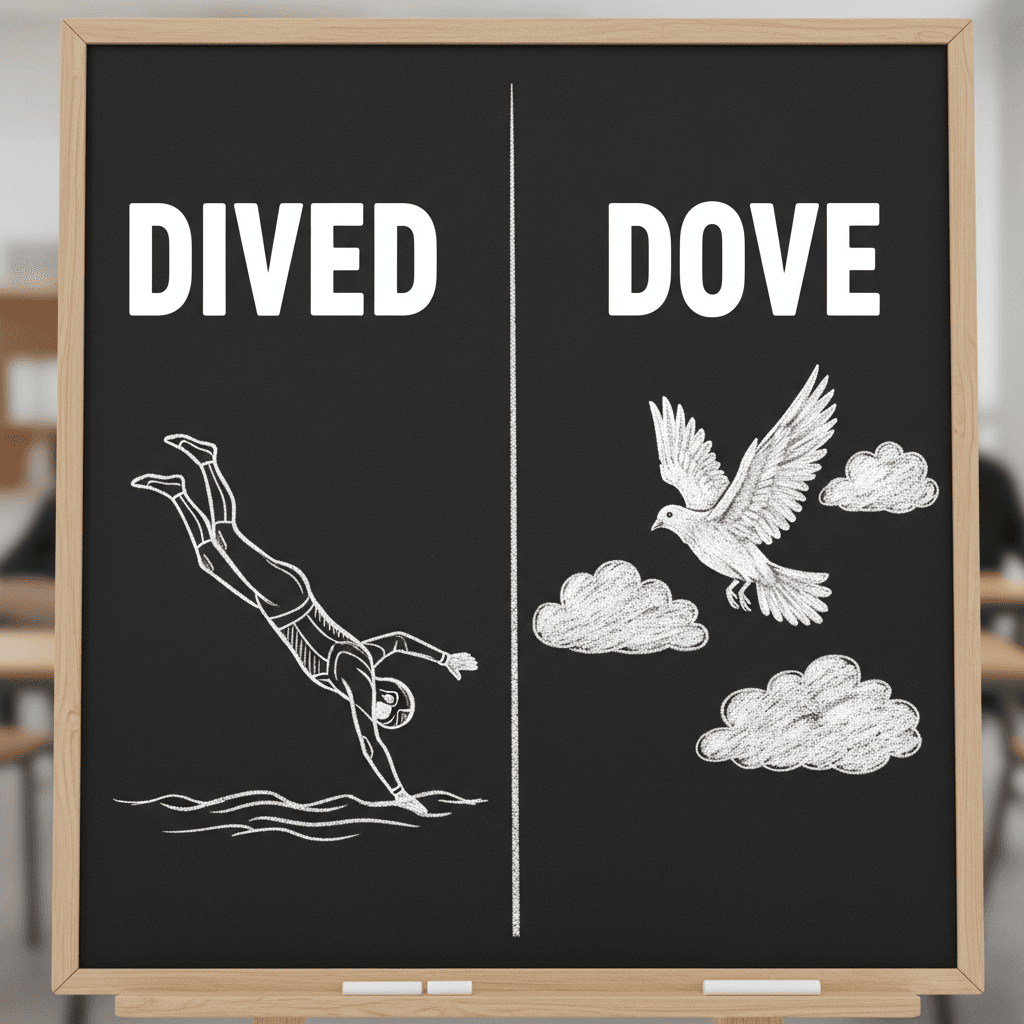Dived vs. Dove: What’s the Difference?
 Both dived and dove are correct past tense forms of the verb dive, which means to jump or plunge headfirst into something, usually water.
Both dived and dove are correct past tense forms of the verb dive, which means to jump or plunge headfirst into something, usually water.
The choice between them depends on regional preference and formality.
Here’s the quick rule:
- Dived → traditional and preferred in British English 🇬🇧
- Dove → more common in American English 🇺🇸
1. Dived: The Original Form
Meaning
“Dived” is the older and more traditional past tense form of dive.
It’s used in British English, formal writing, and international English contexts.
Examples (10 total)
- She dived into the pool gracefully.
- The dolphin dived deep under the surface.
- He dived for cover when the alarm sounded.
- The bird dived toward its prey.
- The submarine dived to avoid detection.
- I dived into the ocean to cool off.
- The goalie dived to save the ball.
- The kids dived off the dock together.
- She dived into her studies with excitement.
- The diver dived from the highest platform.
🧠 Tip:
If you’re writing for a global or British audience, use dived — it’s universally accepted.
“She dived into the water” ✅ (always correct)
2. Dove: The American Variant
Meaning
“Dove” appeared later and became popular in American English during the 19th century, following the pattern of verbs like drive → drove and ride → rode.
It’s now widely accepted in spoken and informal writing in the U.S., but less common elsewhere.
Examples (10 total)
- He dove into the pool with a splash.
- The pelican dove for a fish.
- She dove behind the couch to hide.
- The diver dove from the cliff fearlessly.
- The cat dove under the bed.
- We dove into the lake together.
- He dove for the ball during the game.
- The submarine dove to avoid detection.
- The kids dove into the waves.
- She dove headfirst into her new project.
🧠 Tip:
If you’re writing for an American audience or using a casual tone, dove sounds more natural.
“He dove into the pool” ✅ (common in the U.S.)
3. Quick Comparison Table
| Use | Dived | Dove |
|---|---|---|
| Region | British & international | American |
| Formality | Formal / traditional | Informal / conversational |
| Frequency | Common worldwide | Common in the U.S. only |
| Example 1 | She dived into the water. | She dove into the water. |
| Example 2 | The bird dived for food. | The bird dove for food. |
| In formal writing | ✅ Preferred | ❌ Avoid |
| In spoken U.S. English | ✅ Acceptable | ✅ Preferred |
4. How to Choose
👉 Use dived in formal writing or global English (it’s always correct).
👉 Use dove in informal American English or dialogue to sound natural.
💡 Memory Trick:
“Dove” sounds like “drove” — both are American past tenses that sound more casual.
“Dived” fits traditional grammar — safe in any context.
5. Common Mistakes
❌ He has dove into the water many times.
✅ He has dived into the water many times.
❌ They have dove before.
✅ They have dived before.
(Dove is used only for simple past, not past participle.)
6. Why It’s Confusing
Historically, dive followed regular English verb rules (dive → dived).
But Americans began using dove by analogy with irregular verbs like drive → drove.
Now, both are accepted — but dived remains grammatically safer in all forms.
Modern grammar tools like Humanizey automatically detect your regional style and adjust dived/dove usage accordingly to keep writing consistent and natural.
FAQs
1. Is “dove” grammatically correct?
Yes — it’s accepted in American English for the simple past tense of dive.
2. Can I use “dove” in British writing?
You can, but it will sound American or informal. Use dived instead.
3. What about “have dove”?
That’s nonstandard. The correct form is have dived.
4. Which is more formal?
Dived — it’s accepted in all forms of English and preferred in writing.
Practice: Choose the Correct Word (“Dived” or “Dove”)
(Answers are listed at the end.)
- The swimmer ___ into the deep end of the pool.
- The bird ___ toward the river to catch a fish.
- We ___ for cover when it started raining.
- The dolphin ___ beneath the waves.
- She has ___ into her new job with energy.
- He ___ behind the tree to hide.
- The diver ___ from the highest platform.
- They have ___ in this lake many times.
- The submarine ___ below the surface.
- I ___ into the project without thinking.
Answers
- dove / dived (both OK)
- dove / dived
- dove / dived
- dived
- dived
- dove
- dived
- dived
- dived
- dove
